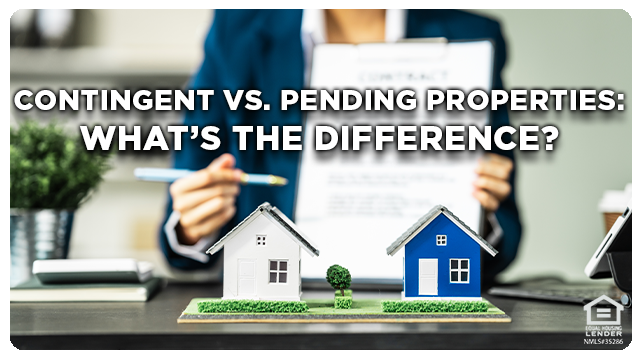Contingent vs. Pending Properties: What’s the Difference?
Blog:Contingent vs. Pending Properties: What’s the Difference?

Posted on
When searching for a new home, you might come across listings marked as "contingent" or "pending," in addition to the usual "active" and "sold" categories.
Both indicate that a house is under contract, meaning the seller has accepted an offer from a buyer, but there are important distinctions to consider.
What Does “Contingent” Mean?
The term "contingent" refers to a contract that is dependent on certain conditions being met before the sale can be finalized. This is a common scenario, as several steps must be completed between the acceptance of an offer and the closing of the deal.
Common Contingencies in Real Estate
Inspection: This contingency allows buyers to have a professional home inspector assess the property’s condition. If significant issues are found, buyers may have the option to cancel the purchase.
Appraisal: An appraisal contingency permits buyers or their lenders to evaluate the property’s fair market value. If the appraisal comes in lower than the agreed purchase price, buyers can choose to negotiate or potentially back out of the deal.
Financing: This gives buyers time to secure the necessary funding. If they fail to obtain a loan, they can back out of the agreement.
Title: A title contingency allows buyers to withdraw if there are ownership issues, such as a co-owner who hasn't consented to the sale.
Home Sale: If a buyer needs to sell their current home to finance the new purchase, they may include a home sale contingency, which allows them to postpone or cancel the purchase if they can't sell their home.
Can You Make an Offer on a Contingent Home?
Yes, if you're interested in a property labeled as contingent, you can still make an offer. However, the original offer will take priority if all contingencies are met. Submitting a competitive offer may position you favorably if the first deal falls through.
What Does “Pending” Mean?
A property marked as "pending" signifies that all contingencies have been satisfied, and the deal is expected to close. Essentially, it means the transaction is in its final stages.
Types of Pending Statuses
Taking Backups: This indicates that while the primary offer is accepted, the seller is still open to considering other offers.
Short Sale: A home listed as a short sale is being sold for less than the amount owed on the mortgage, pending lender approval.
No Show: This status means the seller is not accepting additional showings or offers, as they are confident the sale will close as planned.
Can You Make an Offer on a Pending Home?
While it is technically possible to make an offer on a pending property, it’s up to the seller and their agent whether they will consider additional offers. It’s advisable to communicate with the listing agent to determine if they’re open to new proposals.
Closing Thoughts
If you’re eyeing a contingent or pending property, you may still have opportunities to make an offer or view the home. Understanding these distinctions can empower you to act swiftly and strategically in a competitive market.
We are proud to offer Home Buyer’s Edge, a full credit approval program, and Value Assured, which empowers our borrowers to waive their appraisal contingency with confidence, to help your offer stand out. Give us a call or visit us online to learn more about these exciting programs today.